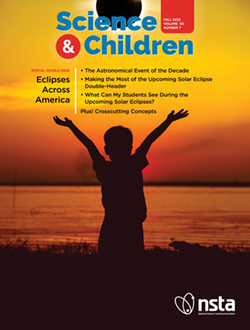Science and Children—Fall 2023

Special Double Issue—Eclipses Across America
Fall 2023
Journal Article
The Importance of Partnership, Support, and Sustained Professional Development
By Jason Harding, Maria Pack, Chris Harrison, and Lucy Wood
Journal Article
Astronauts Zoom: An Astronaut Alphabet
Astronauts Zoom: An Astronaut Alphabet By Deborah Lee Rose September 2020 Persnickety Press 36 pages $16.95 ...
By Peggy Ashbrook and Ann Caspar
Journal Article
By Janet Struble, Kevin Czajkowski, Angela Rizzi, and Jessica Taylor
Journal Article
Making the Most of the Upcoming Solar Eclipse Double-Header
Eclipses of the Sun, where the Moon gets in front of the Sun and blocks its light, are among the most spectacular of natural events. The total eclipse visible in the United States in 2017 fascinated and involved millions of people all across the coun...
By Andrew Fraknoi and Dennis Schatz
Journal Article
The Astronomical Event of the Decade
On Saturday, October 14, 2023, and then again on Monday, April 8, 2024, sky gazers all across North America will experience what is arguably the most breathtaking of astronomical phenomena: a solar eclipse. During the October eclipse, everyone in Nor...
By Anna Hurst, Julia Plummer, Suzanne Gurton, and Dennis Schatz
Journal Article
A circle of fourth-grade students sit around Mrs. Ray, who shows videos and images of two natural events: large rocks that have fallen from a cliffside and large rocks in the middle of a dry stream near a road. She asks, “What caused these events t...
By Lindsey Mohan, Emily Harris, and Candice Guy-Gaytán
Journal Article
Using Argument to Reason About Science Practice
We have been working for nearly two decades with teachers across all grade bands to promote productive argumentation. From this experience, and those of others interested in the same goals, we have extracted a simple strategy for promoting and suppor...
By William Sandoval, Jon Kovach, Leticia Perez, Lynn Kim-John, and Jarod Kawasaki
Journal Article
Growing Students' Meaning-Making
In this sensemaking lesson, K–2 students explore how different factors influence seed germination and explain the elements necessary to sprout. Notebook strategies are embedded throughout the explore-before-explain lesson to help students organize ...
By Patrick Brown, Jessica Fries-Gaither, and Kathy Renfrew
Journal Article
Computational Modeling With Multilingual Learners
While the vision for science education through A Framework for K–12 Science Education (NRC 2012) and the Next Generation Science Standards (NGSS) continues to take hold in classrooms across the nation, computational modeling is becoming increasingl...
By Alison Haas, Scott E. Grapin, Lorena Llosa, and Okhee Lee
Journal Article
How Does Sound Travel in a String?
In Chinese science curriculum, the sound unit generally starts with observing various sound making phenomena and finding out that they all involve vibration....
By Gang Shu, Xiaowei Tang, and Huimin Chen
Journal Article
Cardboard, a common maker space material, is inexpensive, readily available, and durable. It is also easy to manipulate. It can be folded, cut, painted, and taped or glued together. Caine’s Arcade, a video featuring Caine Monroy’s cardboard arcad...
By Julie Jackson, Julie Brenegan, Kristi Wagner, and Michelle Berry
Journal Article
Making the Most of Field Trips
Field trips can be a unique way to engage elementary students in science content. However, budget cuts and a focus on standardized testing are causing some schools to greatly reduce the funding for field trips (Meyer 2008). In the wake of the last re...
By Nicole Hesson
Journal Article
Q: What Can My Students See During the Upcoming Solar Eclipses?
A: It depends on where you are located. But first let’s briefly review what happens during a solar eclipse and clear up a few popular misconceptions about solar eclipses. You probably know that a solar eclipse occurs when the Moon passes between th...
By Matt Bobrowsky
Journal Article
Educators are increasingly recognizing that significant amounts of science learning take place over the course of one’s lifetime and that much of this learning takes place outside of school settings (NRC 2009). Americans spend on average “less th...
By M. Gail Jones and Megan Ennes


